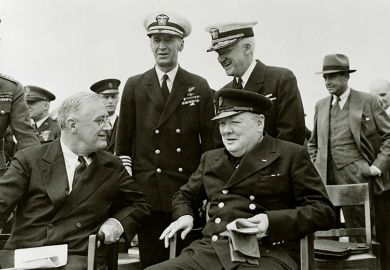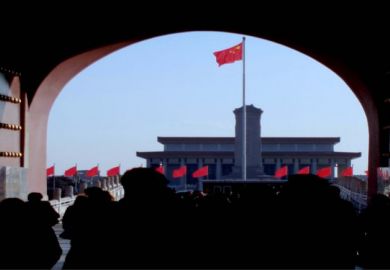When Boris Johnson came out in support of Brexit, he likened the media scrum that awaited him outside his home to “an imperial goat-fuck”. This book isn’t about that kind of shadow but the lineage of a predominantly but not exclusively right-wing British foreign policy focused on promoting economic and cultural ties with an Anglosphere.
Concise and well-written, Kenny and Pearce’s book will be of great value to students interested in the history of Britain’s international relations from the heyday of empire to the present. It offers a historically grounded overview of this almost impossibly amorphous (and rather dull) tradition in high politics. Attempts to strengthen British power through political alliances based on shared language, culture and history began in earnest with the empire’s phase of Anglo-globalisation and had a racist element.
This late 19th-century project was based on a vision of a Greater Britain taking up the “white man’s burden” and the concept of the “English-speaking peoples”. This Anglosphere could refer to “the Old Commonwealth” (Australia, Canada and New Zealand), but often it meant “Anglo-America” and “the special relationship”. More recently, it’s been lauded as a community of shared values, while the recent “global Britain” campaign emphasised economic ties with the US, India and other areas of the Commonwealth.
Written by two eminent professors of public policy, this account begins with the mid Victorian origins of the Anglosphere, familiar to imperial historians. It moves quickly on to changing political discourses after the end of empire, with particular emphasis on Churchill’s formula for British “great power” status focused on ties with the US and the Commonwealth. The contemporary period offers the most interesting, less trodden material, including discussions of the “intellectuals” of the Anglosphere, and how Eurosceptics have cleaved towards it.
The final chapter is called “Brexit – The Anglosphere Triumphant?” Indeed, this book is marketed as an explanation for Brexit. As the authors put it, the Anglosphere “is a vital, overlooked part of the complex story that has led up to Brexit”. Overlooked, possibly; vital, no. I doubt many Brexiteers thought “We’ll be OK, the Canadians still like us”.
Leavers voted for what they didn’t want: a German-dominated European super-state and uncontrolled migration (because Great-Uncle Henry had died on a trolley waiting in a hospital corridor for eight hours). Nostalgia – if that played a part – was not for an imperial past but for heroically “going it alone” in war, even to the brink of national self-immolation. So, the logic followed, let’s face decline with the same spirit.
It’s true, nevertheless, as the authors argue, that the Anglosphere has reappeared as a partial post-Brexit solution. It makes some sense. An Anglosphere does exist on a practical level: English-speaking people connected by history, culture, education systems and trade. Alas, it also has its extremists, who see such alliances in terms of a pernicious ideology of racism and neo-imperialism. “Male, pale and stale”, they are long past their sell-by date. As the late Christopher Hitchens pointed out, an Anglosphere coalition to fight extremism could never succeed “on the imperial terrain of Kipling and Rhodes”. However, the main winners of an Anglosphere triumphant would be lesser members of the royal family, assured of free overseas jollies for years to come. Lots to look forward to, then.
Joanna Lewis is associate professor of international history at the London School of Economics and the author of Empire of Sentiment: The Death of Livingstone and the Myth of Victorian Imperialism (2018).
Shadows of Empire: The Anglosphere in British Politics
By Michael Kenny and Nick Pearce
Polity Press, 224pp, £50.00 and £14.99
ISBN 9781509516605 and 9781509516612
Published 6 April 2018
Register to continue
Why register?
- Registration is free and only takes a moment
- Once registered, you can read 3 articles a month
- Sign up for our newsletter
Subscribe
Or subscribe for unlimited access to:
- Unlimited access to news, views, insights & reviews
- Digital editions
- Digital access to THE’s university and college rankings analysis
Already registered or a current subscriber?








